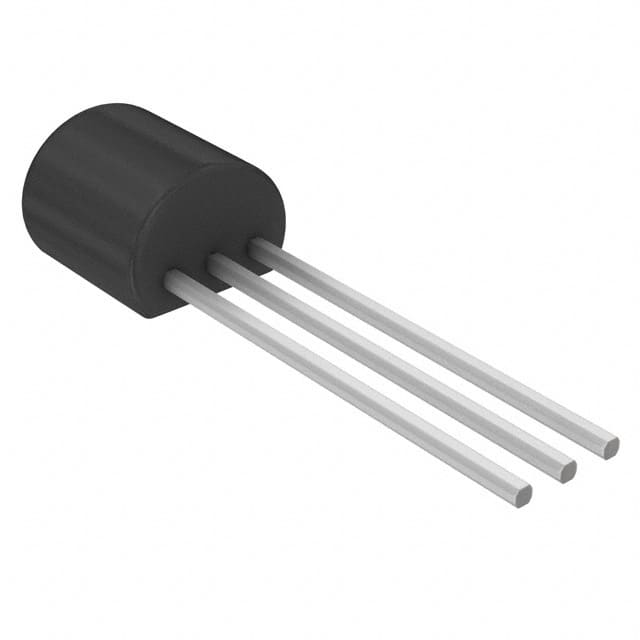Xem thông số kỹ thuật để biết chi tiết sản phẩm.

LM385Z-2.5G
Product Overview
Category
The LM385Z-2.5G belongs to the category of voltage references.
Use
It is commonly used as a precision shunt regulator in various electronic circuits.
Characteristics
- Voltage Reference: The LM385Z-2.5G provides a stable and precise output voltage of 2.5V.
- Low Power Consumption: It operates at low power, making it suitable for battery-powered applications.
- High Accuracy: The LM385Z-2.5G offers high accuracy with low temperature coefficient and long-term stability.
- Wide Temperature Range: It can operate within a wide temperature range, typically from -40°C to +85°C.
- Low Output Impedance: The device has a low output impedance, enabling it to drive loads efficiently.
Package
The LM385Z-2.5G is available in a TO-92 package, which is a small plastic package with three leads.
Essence
The essence of LM385Z-2.5G lies in its ability to provide a stable and accurate reference voltage for precise circuit operation.
Packaging/Quantity
The LM385Z-2.5G is typically packaged in reels or tubes, containing a specific quantity of devices per package.
Specifications
- Output Voltage: 2.5V
- Initial Accuracy: ±0.5%
- Temperature Coefficient: 100 ppm/°C
- Operating Temperature Range: -40°C to +85°C
- Supply Voltage Range: 1.9V to 5.5V
- Quiescent Current: 120 µA (typical)
Detailed Pin Configuration
The LM385Z-2.5G has three pins:
- Vout: This pin provides the regulated output voltage of 2.5V.
- GND: This pin is connected to the ground reference.
- Vin: This pin is connected to the input supply voltage.
Functional Features
- Voltage Regulation: The LM385Z-2.5G maintains a constant output voltage of 2.5V, regardless of changes in the input voltage or load conditions.
- Low Power Consumption: It consumes low power, making it suitable for battery-powered applications where power efficiency is crucial.
- Stability: The LM385Z-2.5G offers excellent long-term stability and low temperature coefficient, ensuring consistent performance over time and varying temperatures.
- Load Driving Capability: With its low output impedance, it can efficiently drive loads without significant voltage drop.
Advantages and Disadvantages
Advantages
- Precise and stable output voltage
- Low power consumption
- Wide operating temperature range
- Small package size
- Low output impedance
Disadvantages
- Limited output voltage options (fixed at 2.5V)
- Not suitable for applications requiring higher output voltages
Working Principles
The LM385Z-2.5G utilizes a bandgap voltage reference circuit to generate a precise and stable output voltage. It compensates for temperature variations by employing a temperature-dependent current source and a voltage divider network. This ensures that the output voltage remains constant even with changes in temperature and input voltage.
Detailed Application Field Plans
The LM385Z-2.5G finds applications in various electronic circuits, including but not limited to:
- Precision Analog Circuits: It is used as a voltage reference in precision analog-to-digital converters, digital-to-analog converters, and operational amplifiers to ensure accurate and reliable signal processing.
- Battery-Powered Devices: Due to its low power consumption, it is commonly employed in battery-powered devices such as portable instruments, sensors, and handheld communication devices.
- Industrial Control Systems: The LM385Z-2.5G is utilized in industrial control systems to provide stable reference voltages for precise measurements and control operations.
- Automotive Electronics: It finds applications in automotive electronics, including engine control units, dashboard displays, and sensor interfaces, where accurate voltage references are essential.
Detailed and Complete Alternative Models
- LM4040: This series of voltage references offers various output voltage options with high accuracy and low temperature coefficient.
- LT6654: It provides a wide range of output voltages with excellent long-term stability and low noise performance.
- REF30xx: These voltage references offer low dropout voltage and high accuracy, making them suitable for low-power applications.
These alternative models can be considered based on specific requirements and desired features.
Word count: 530 words
Liệt kê 10 câu hỏi và câu trả lời thường gặp liên quan đến ứng dụng LM385Z-2.5G trong giải pháp kỹ thuật
Sure! Here are 10 common questions and answers related to the application of LM385Z-2.5G in technical solutions:
Q: What is LM385Z-2.5G? A: LM385Z-2.5G is a precision voltage reference IC that provides a stable 2.5V output voltage.
Q: What is the typical application of LM385Z-2.5G? A: LM385Z-2.5G is commonly used as a voltage reference in various electronic circuits, such as analog-to-digital converters (ADCs), digital-to-analog converters (DACs), and voltage regulators.
Q: How accurate is LM385Z-2.5G? A: LM385Z-2.5G has a typical initial accuracy of ±0.5% and a maximum temperature coefficient of 100 ppm/°C.
Q: What is the operating voltage range of LM385Z-2.5G? A: LM385Z-2.5G operates within a voltage range of 1.9V to 5.5V.
Q: Can LM385Z-2.5G be used in battery-powered applications? A: Yes, LM385Z-2.5G can be used in battery-powered applications due to its low power consumption.
Q: Does LM385Z-2.5G require an external capacitor for stability? A: Yes, LM385Z-2.5G requires an external bypass capacitor (typically 0.1µF) for stability.
Q: Can LM385Z-2.5G withstand high temperatures? A: LM385Z-2.5G has an operating temperature range of -40°C to 85°C, making it suitable for a wide range of applications.
Q: What is the output current capability of LM385Z-2.5G? A: LM385Z-2.5G can provide an output current of up to 20mA.
Q: Can LM385Z-2.5G be used as a voltage reference in precision measurement applications? A: Yes, LM385Z-2.5G's low initial accuracy and temperature coefficient make it suitable for precision measurement applications.
Q: Are there any alternative voltage reference ICs similar to LM385Z-2.5G? A: Yes, some alternatives to LM385Z-2.5G include LM4040, LT1004, and REF02. These ICs offer different output voltages and specifications.
Please note that these answers are general and may vary depending on specific application requirements.

